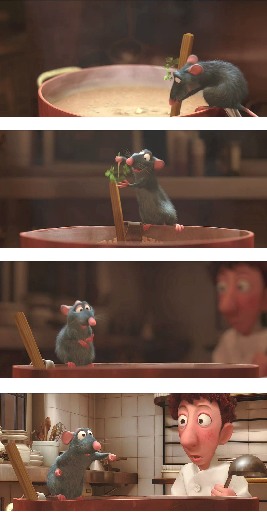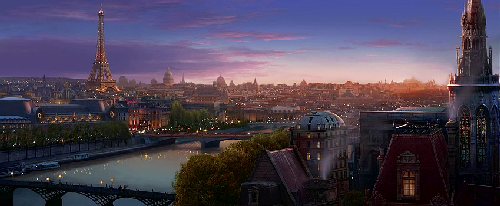Ratatouille (Brad Bird, 2007)
Pixar’s newest film, Ratatouille, sees the studio’s gun director, Brad Bird, try his hand at saving a troubled production. The result is a somewhat messy and not completely satisfactory film, but still one that sees the studio expanding the horizons of the form.
Bird is an exciting figure. He worked with Disney in the 1980s, and was mentored by legendary animator Milt Kahl, before becoming one of the key creative personnel in the early years of The Simpsons. He then directed the acclaimed (but underseen) The Iron Giant for Warner Bros before joining Pixar to helm The Incredibles. It’s a career progression that moves from a start under one of animation’s great figures, to a key role in the renaissance of television animation, and then a shift to theatrical features just as that area was growing moribund again after a revival in the nineties. As everyone else’s features have grown more and more alike – with jive-talking animals, fart jokes and pop culture gags galore – Bird’s films have remained distinct. They stand apart from even the generally superior films produced by Pixar: while the other Pixar films show a clear house style that is very much driven by the sensibilities of Toy Story director John Lasseter (and which in Cars had started to slide towards mediocrity), Bird’s films are distinguished by their more adult tone and adventurous subject matter.
Bird took over Ratatouille from Jan Pinkava, reportedly after the film got bogged down with story troubles during its development (Pinkava gets what seems to be a rather grudging co-director credit at the start of the credit roll). Bird’s reworking was thorough enough that he is credited as the film’s screenwriter, but the guts of the story seem to have survived from Pinkava’s version. Remy is a French rat who has exquisite sense of taste and smell, and as such finds it difficult to live the scavenging existence of a regular rat. Instead, he aspires to cooking great cuisine, inspired by the writing of chef Auguste Gusteau, whose cookbook was titled after his motto: Anyone Can Cook. Through a series of misadventures, Remy finds himself at Gusteau’s restaurant in Paris, where his quest to be a great chef intersects with the life of hapless garbage boy Linguini.
 Despite Bird’s foreshortened involvement on the film – its release date wasn’t pushed back to accommodate his work, meaning that he had eighteen months to reshape a film that had by that time been in development for several years – its chief virtues are recognisable from Bird’s other films. Bird’s own description of his role on The Simpsons (here) was that he worked on the storyboards to make them more cinematic, and his skill as a director is immediately noticeable. There are flashy sequences, as where Bird takes advantage of the free-floating camera possible in computer animation for breathless chases through both the restaurant and the streets of Paris. But there are also more subtle touches that show a good director’s canny knack for maximising the moment. For example, in the key scene where Remy is discovered by Linguini making changes to a soup, the camera circles the pot in a long, swooping spiral, only to stop dead still – along with the characters – for a long beat when Linguini appears behind him. Bird amplifies the moment even more by dulling the lighting on the background to highlight Remy’s reverie, and then abruptly pulling the light level up at the moment Linguini appears (as shown in the frames at right). It’s a great way to underline both Remy’s surprise, and also the critical nature of the moment.
Despite Bird’s foreshortened involvement on the film – its release date wasn’t pushed back to accommodate his work, meaning that he had eighteen months to reshape a film that had by that time been in development for several years – its chief virtues are recognisable from Bird’s other films. Bird’s own description of his role on The Simpsons (here) was that he worked on the storyboards to make them more cinematic, and his skill as a director is immediately noticeable. There are flashy sequences, as where Bird takes advantage of the free-floating camera possible in computer animation for breathless chases through both the restaurant and the streets of Paris. But there are also more subtle touches that show a good director’s canny knack for maximising the moment. For example, in the key scene where Remy is discovered by Linguini making changes to a soup, the camera circles the pot in a long, swooping spiral, only to stop dead still – along with the characters – for a long beat when Linguini appears behind him. Bird amplifies the moment even more by dulling the lighting on the background to highlight Remy’s reverie, and then abruptly pulling the light level up at the moment Linguini appears (as shown in the frames at right). It’s a great way to underline both Remy’s surprise, and also the critical nature of the moment.
Bird’s eye for detail extends to the quality of the animation: as in The Incredibles, the animation is well ahead of the level we have seen in other computer animated features. Nobody else working in computer animation has made as extensive use of cartoonishly designed human characters – as opposed to the ultra-realistic mannequins seen in the Shrek series – and Ratatouille’s humans are handsomely designed and expressive. The level of expression and comic acting Bird achieves with both the humans and animal characters is remarkable, and there are scenes (such as the out of control movements of Linguini when he is being “puppetted” by Remy) that are built purely around bits of comic animation. It’s a refreshing change from the generally verbal humour of many computer-animated films, and hopefully those who praised the awful motion-captured animation in films such as Happy Feet will start to realise that there is a difference between faux-animation and the real thing.
The other exciting thing about Ratatouille is its visual look: it is far and away the best-looking computer animated film I have seen. Previous computer animated films have tended to play to the strengths of the medium by emphasising ultra-realistic, super-clean surfaces and vibrant colour schemes. It’s a beautiful look in its own way, and very suited to certain subject matter (such as tropical fish and coral in Finding Nemo or the bright green ogre and fairy-tale world of Shrek), but we’ve also seen that aesthetic pushed about as far as it can go. There have been hints in a few previous films of the potential to move computer animation into different sorts of visuals, that are both more realistic but also more subtle in their range, but Ratatouille is the most dramatic demonstration of what those future movies might look like. The environments are at times startlingly photo-realistic, but there’s also a painterly quality to them, and the visual palette has warmed up and moved beyond the usual high-contrast eye-candy. This was one area where Bird probably got to benefit most fully from the years of development under Pinkava, and the depiction of Paris is breathtakingly beautiful and startlingly accurate: there were times (particularly in a chase along the Seine) where I felt I recognised actual locations. Ratatouille is a reminder that there’s no longer a need to skew the subject matter of computer animated films to objects that look good in the medium. Everything looks wonderful here.

After all those positives, it’s disappointing that the film can never quite overcome the legacy of its troubled production. We’ll never know how serious the story problems were on Pinkava’s version, but certainly the shortcomings with Bird’s film are largely story-related, and suggest that perhaps Bird needed to be given more time to rework it after he took it over. For example, there’s an awkwardness to the exposition in the scenes where Linguini talks to Remy, or when Remy engages in internal dialogue with a ghostly embodiment of Auguste Gusteau. In both cases the monologue / dialogue is clunky, and suggests Bird is trying to force a story that isn’t unfolding as naturally as it should. There’s also a hint of unresolved story problems in the conclusion, in which we are offhandedly told in voiceover narration that the characters have not achieved the goal for which they’ve strived for the whole film.
More of a problem is that several of the characters don’t quite gel. Remy himself is a little too elitist and self-satisfied to be engaging, while Linguini is so totally inept that it’s hard to take any satisfaction in his good fortune as the film plays out. In this respect, at least, it’s possible to feel the influence of Bird in one of the film’s weaknesses too. Remy’s exceptional ability as a cook echoes the freakish powers of the lead characters of The Incredibles, and Bird’s approach to Remy’s skills echoes the attitude he took in the earlier film. In The Incredibles Bird took a dim view of any attempts to make the superheroes compromise to blend in with society, and he had still less patience with attempts to encourage those born with lesser gifts. “They keep creating new ways to celebrate mediocrity,” was a key gripe of Mr Incredible, and the villain of that film was Buddy / Syndrome, a kid who wants to be special despite a lack of God-given talent. As I suggested in my review of that film, there was something a little muddled about Bird’s thinking there, and that sense of a slightly ill-thought-out ideology is there again in Ratatouille. Once again, Bird shows his characters as being super-talented by nature, with any kind of hard work playing only a secondary role in their development, and the biggest obstacle they face is an ungrateful populace who don’t recognise their gifts. As Mark Mayerson has put it:
For Bird, ambition is not for personal glory, it’s simply to reach a position where talent can be exercised. This is an interesting contrast to John Lasseter’s characters in Toy Story and Cars. In those films, Woody and Lightning McQueen attempt to lead out of ego and only discover happiness when they forsake ambition.
A Lasseter version of Ratatouille would probably have focussed on the relationship between Remy and Linguini: Remy might have learnt some humility from Linguini, who in turn would through hard work and perseverance have developed some previously unrealised talent. In Bird’s conception, though, Remy is right to feel as brilliant as he does, and the less talented like Linguini need to just get out of his way and leave him to his stuff. Lasseter would have had Remy recognising the importance of teamwork and acknowledge Linguini’s role, but for Bird it’s Linguini who has to learn to be more humble after he wrongly starts believing he can cook; the climax of the film is when Remy can cast Linguini aside. It makes a mockery of the film’s oft-repeated mantra that “anyone can cook:” what Bird seems to mean by that is not that we all have the ability within us, but that the messianic super-achievers can turn up anywhere, and we should show proper respect when they start bossing us about. Which might well be true, but it’s an unusual thematic framework for the usually egalitarian Hollywood cinema, and not a terribly satisfying message from a storytelling perspective.
A number of writers, such as Michael Barrier (here), have suggested that there’s something autobiographical in Bird’s thematics. As an exceptionally talented animator who struggled for a long time to achieve the success of The Incredibles in an ungrateful industry, Bird might be forgiven for exorcising a few demons with these films. But hopefully he can move past those preoccupations in his future projects: as it is, Ratatouille is a beautifully prepared dish that is just a shade sour.